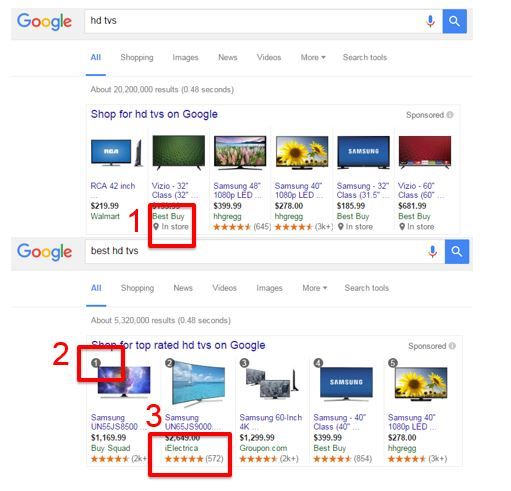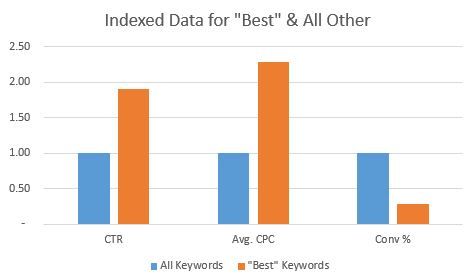Recently we've had a lot of internal discussions about the importance of keywords and the various combinations, including match type.
This discussion revealed a few interesting nuances that I thought were worth sharing.
The focus will be how the search results page changes with just one additional change to the search query and what the implications of that word mean.
For this article I picked the keyword “best.” This is certainly worth looking into as much as a number of other terms like “near me,” “cheap,” or “men/women/kids,” however “best” also makes all the points I'd like to share.
How does the search results page change?
Let's start by searching for “HD TVs” and then adding the word “best.”
From a user intent perspective you would assume that this is still pretty high in the funnel. The customer isn't sure which TV or brand they are looking for. But by adding the word “best” to the query Google makes a few key changes to the search results;
- In-store only appears on the more generic “HD TV” search. Google makes an assumption that local inventory has a greater level of influence on this type of search.
- Ranking bubbles are included when the term “best” is included. Google is inferring that some type of ranking is desired by the consumer and uses ratings and reviews as the driver behind these rankings.
- Star ratings are included for all ads when “best” is included. Similar to the ranking bubbles Google is assuming that consumer feedback will be the most helpful in this situation.

What does the data say?
I also wanted to take a quick look at the data to see how these keywords performed. I pulled a search term report and filtered for keywords containing “best.”
What I found was pretty interesting. In all the metrics “best” keyword metrics were roughly 2X of the average across all keywords. This indicates two things:
- Consumers are responding at a very high level to these keywords with high interest.
- Due to this consumer reaction the cost for these queries is also much higher than the norm. This makes sense and is really the beauty of a free market economy.

What does it mean?
The keys to consider here are less about the inclusion of the keyword and more about how you support a robust search listing and how you use the data:
1) Robust listings
It is important not only that your product listing ads are included, but also that your local inventory and ratings are robust.
You can see that between these two queries not only are those 3 factors different in the results, but there is not a single repeat product shown between the two, although the same brands appear. This means that having multiple options and a deep product set available for Google to rank is key to getting displayed for these impressions.
2) Data use
Just because a keyword has a high CTR or CPC, it doesn't mean that it is valuable or not unless those are your key performance metrics.
Even the lower conversion % for keywords containing best doesn't mean that they are bad. You have to look at attribution, or their additive incremental impact your campaigns. Understand what metrics move your business and look at the problem through multiple lenses.
For example, does this keyword introduce you to new customers and therefore a higher CPC and lower conversion rate is worth the traffic? Only you know that answer for your business, but there is plenty of data to help make that decision.
No comments:
Post a Comment